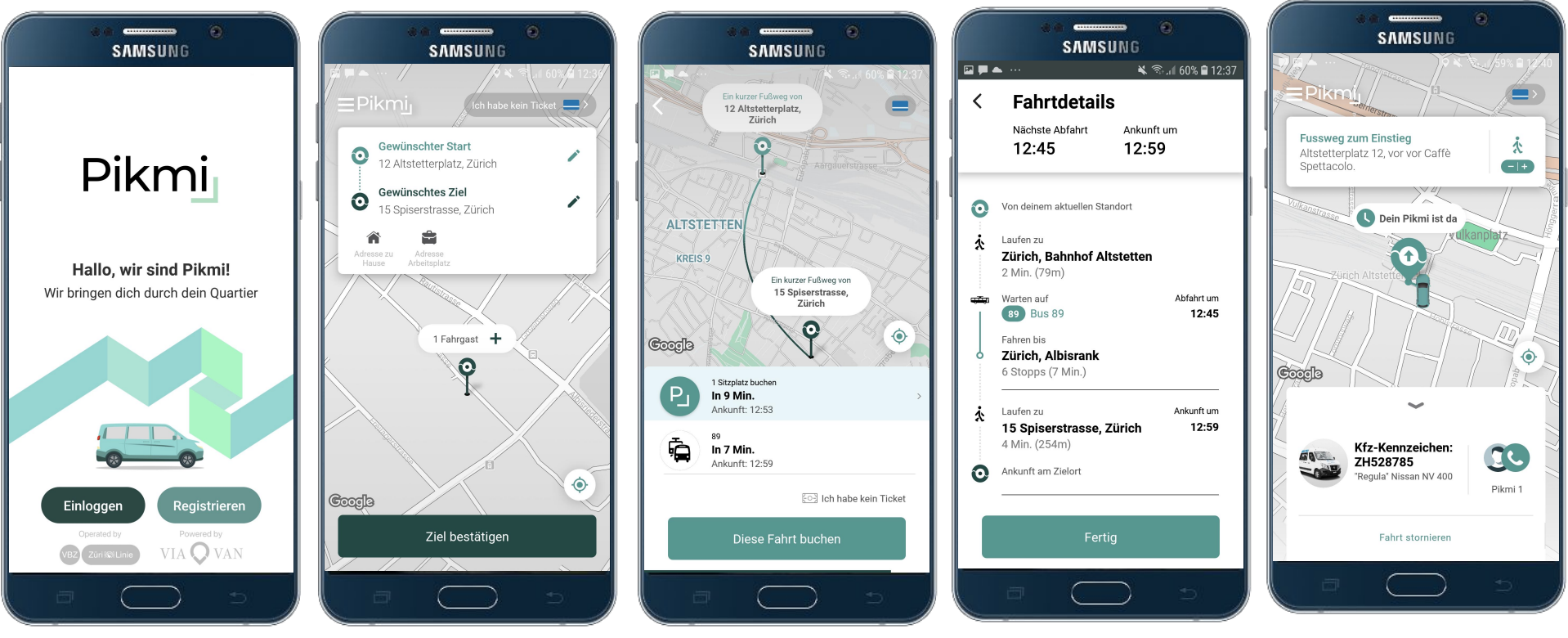ViaVan and VBZ launch first on-demand public transport service in Zurich
November 10, 2020 (ZURICH)-- Tonight, the Zurich Transport Authority (VBZ), together with the Traffic Department, Civil Engineering Office of the City of Zurich, and ViaVan, Europe’s leading provider of public mobility solutions, launch “Pikmi”, the first on-demand public transport service in the city of Zurich.
The vehicles fill the gaps in the evening hours from 8 pm to midnight when traditional public transport offerings are less available. In addition to the Zurich quarters of Altstetten and Albisrieden, the operating area also includes the Triemli and Hardplatz transport hubs. Within this area, Pikmi enables new and quick connections to public transport. The service is booked through the Pikmi mobile app, powered by technology from ViaVan. The evening bus is fully integrated into the public transport zone tariff, so that passengers do not have to buy an additional ticket for the journey.
The 18-month pilot will demonstrate the ways in which technology can increase efficiency in public transport, while reducing private vehicle traffic (see announcement press release from September 2020) By introducing a new flexible mobility concept, VBZ wants to react to changing public transport usage habits and provide a customer-friendly offering.
.png)
“It has become clear as a result of the COVID-19 pandemic that we have to respond to new challenges with innovative ideas. It is therefore important to test new technologies in operation,” explains City Councilor Michael Baumer, Head of the Industrial Companies of the City of Zurich. “In addition, the pilot project, which is part of the city's strategic focus areas, is another step for Zurich towards becoming a smart city.”
On-demand public transport
A trip is booked using the Pikmi mobile app, developed by ViaVan. The app shows passengers the expected waiting time until pick-up, and the route to the nearest stop. ViaVan’s technology matches multiple passengers headed in a similar direction into a single vehicle, and calculates the most efficient route in real-time. With every journey there is therefore the possibility that the route will be adjusted slightly, and that additional passengers may join the ride.
Since the vehicles are shared, the national protection concept for public transport under COVID-19 applies: Masks are required in the vehicles. Additionally, seat capacity will be limited to a maximum of three out of the total five seats to allow for more distance between the passengers.
“Flexible, shared mobility solutions like Pikmi can expand access to public transport and thus create a long-term alternative to private transport,” says ViaVan CEO Chris Snyder. "ViaVan's algorithm enables fast and efficient shared journeys that avoid unnecessary detours and long wait times, and at the same time reduce traffic and emissions."
ViaVan already works with transport authorities and cities across Europe, including BVG in Berlin and EMT in Madrid, to expand access to on-demand public transport. Pikmi is ViaVan’s first service in Switzerland, and represents an opportunity for the partners to demonstrate the value that on-demand public transport brings for cities and towns across the nation.

Additional stops and new connections
In contrast to regular public transport, Pikmi does not operate on predefined routes or according to a fixed timetable. In addition to the existing VBZ stops in the operating area, nearly 150 additional “virtual bus stops” that do not require any additional infrastructure will be added. The location of each virtual bus stop is described in detail for passengers as they prepare for pick-up through the Pikmi app.
"Thanks to the dense network of stops, the next Pikmi stop for our customers is right around the corner," says VBZ Director Guido Schoch. "VBZ wants to find out whether this innovative offer can attract additional customers."
To use Pikmi, passengers need a ticket for the city of Zurich (Zone 110), or a corresponding subscription. This creates a very attractive connection to the existing main axes of public transport. Thanks to the dynamic routing of ViaVan, the new offer also enables new cross connections in the district, from Triemli to Altstetten, for example.

Evaluation of experiences
Vehicle provider Mobility uses the shuttles elsewhere during the day, and for the Pikmi service between 8 p.m. and midnight.
“We want to use our car sharing vehicles as efficiently as possible. Since Mobility's booking frequencies are lower at night, mixed operation makes sense,” explains Mobility Managing Director Roland Lötscher.
In addition, on-demand mobility is on the rise: “Younger people in particular want mobility at the push of a button. The project allows us to learn more in this area too."
Since the vehicles will be integrated into Mobility’s existing fleet after the pilot project has been completed, they are not equipped for transport for people in wheelchairs due to the limited usage time. For this reason, VBZ is working with the Disabled Transport Foundation Zurich (BTZ) to serve the booking inquiries by all customers.
Pikmi is intended to demonstrate what infrastructure and vehicle requirements would be necessary to efficiently operate an inclusive, on-demand transport network in the future. In addition, passengers without smartphones will be able to book a ride by telephone with a customer service agent. With these features, the service will enable VBZ to gain experience that will both optimize and support booking efforts of on-demand transit in Zurich.
During the project, operational parameters can be adjusted in order to react to findings from ongoing operations. When evaluating the entire operating experience, VBZ will work together with the Institute for Transport Planning and Systems at ETH Zurich.
About ViaVan:
ViaVan is the leading provider of innovative on-demand shared transit services in Europe. ViaVan was founded in 2017 as a joint venture between Via, the world’s most sophisticated developer of dynamic shared ride technology, and Mercedes-Benz Vans, the leading manufacturer of iconic passenger and cargo vans. Working closely with cities and public transit operators, ViaVan powers dynamic mobility services that complement existing transportation infrastructure. ViaVan operates direct-to-consumer services and on-demand services in partnership with major public transit authorities, including the BerlKönig with Berliner Verkehrsbetriebe (BVG). Through their partnership, Mercedes-Benz Vans and Via are also collaborating on the development of advanced mobility solutions, from sensor technology, to electric vehicle fleet management, to autonomous driving. With more than 150 launched and pending deployments on six continents, Via and ViaVan have provided more than 80 million rides to date. For more information, visit www.viavan.com.